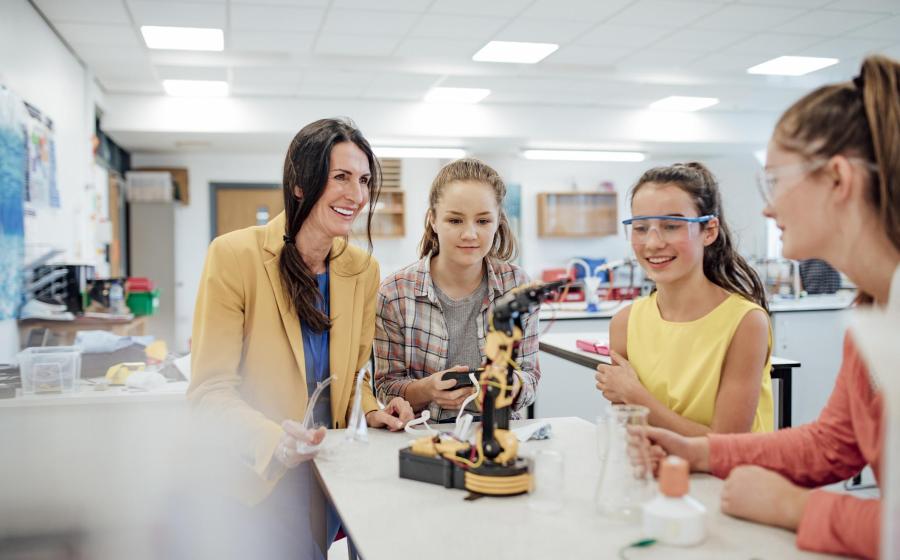Virtual Simulations Can Save Lives in the Industrial Sector
(NewsUSA) - More than 2.3 million workers were injured on the job last year in the U.S., according to the Bureau of Labor Statistics. Workers in the industrial sector face significant risks due to routine exposure to heavy equipment such as cranes or machinery, load handling activities, operating electrical components, and heights. These hazards not only endanger workers but also have widespread implications for businesses, including operational disruptions and financial losses. The National Safety Council estimates that workplace injuries cost employers $167 billion annually in lost wages, medical and administrative costs, and time spent hiring and training replacements.
- More than 2.3 million workers were injured on the job last year in the U.S., according to the Bureau of Labor Statistics. Workers in the industrial sector face significant risks due to routine exposure to heavy equipment such as cranes or machinery, load handling activities, operating electrical components, and heights. These hazards not only endanger workers but also have widespread implications for businesses, including operational disruptions and financial losses. The National Safety Council estimates that workplace injuries cost employers $167 billion annually in lost wages, medical and administrative costs, and time spent hiring and training replacements.
Safety is too important to leave to chance. Training can increase awareness and improve worker safety, but traditional training methods don’t always provide the hands-on, realistic experiences that prepare workers for real-world challenges.
Using Simulations for Safer Operations
Simulations can make training more effective and have been used for decades in complex, high-stakes industries such as aviation and the surgical field. Virtual simulations re-create realistic, dangerous, real-world scenarios in a safe, controlled environment, giving workers the opportunity to practice high-risk, complex tasks and safety procedures.
Plus, workers can get unlimited practice and repeat scenarios using a wide variety of equipment until they master it, reducing risks, preventing injuries, and saving lives. Workers in industrial settings are often faced with the need to make quick decisions in stressful situations, and they need to be prepared.
One company leading the charge on using simulations for safer operations is Interplay Learning, with its acquisition of Industrial Training International (ITI), a global leader in learning solutions for crane, rigging, and load handling activities. The company offers innovative training solutions in the industrial sector on a wide range of topics that including safety and lift planning and management. By blending classroom training with hands-on learning, employers can adopt a hybrid safety approach that increases engagement, understanding, and skill mastery.
Seeing Simulations in Action
Crane operators paint the picture of an essential role where even minor errors can have catastrophic consequences. Sitting in the cab of a crane can be intimidating, even when everything is going right. Operators need to master technical skills, safety protocols, and situational awareness, paying attention to balance, overhead powerlines, the wind, safe lifting practices, and more.
A crane simulator allows workers to experience not only the basics of operating complex machinery but also malfunctions and emergency scenarios that would be impossible to recreate safely while on the job.
Simulations, whether they’re in crane operations or troubleshooting an electrical circuit, also provide real-time data, showing workers where they made mistakes and how to improve. Integrating real-time feedback and artificial intelligence allows employers to tailor training programs to each employee’s specific needs, increasing efficiency and ensuring workers focus on the areas they need to master.
An added benefit of simulation-based training is the ability to standardize the experience, ensuring that all workers, regardless of their location, receive the same high-quality experience. It eliminates the variables associated with specific trainers and training conditions. It also decreases the need for physical equipment, reduces the risk of accidents during training, and provides increased flexibility and accessibility for remote or shift workers.
Cultivating Safety Culture
When safety is a top priority, workers feel valued and are more engaged. Real-world training scenarios reinforce safe work habits and teach safety measures to minimize on-the-job injuries, helping cultivate a safety culture.
More importantly, workers trained using innovative simulations are more confident and better equipped to handle dangerous situations if they occur. In an emergency, even seconds count. Reacting quickly and accurately minimizes exposure for everyone on the job site.
Investing in training also boosts employee morale, increases loyalty, and improves retention. The University of Phoenix Career Optimism’s Index found that 65% of workers said how much a company invests in reskilling/upskilling is something they consider when looking for new opportunities, and 69% said they would be more likely to stay with an employer throughout their career if the company provided opportunities for applying new skills.
Embracing the Latest Technology
New technology continues to make training for industrial workers safer and more effective, and training programs should evolve when new solutions become available. With its acquisition of ITI, Interplay Learning now offers online training courses and simulations for crane operations, rigging and load handling, making it easy and affordable to include virtual simulations in training programs through cloud-based learning platforms. Workers can access the training via laptops, desktops, tablets, and virtual reality headsets, reducing logistical barriers and eliminating the need for expensive equipment.
Content is updated regularly and can be customized to address an organization’s and employee’s needs and priorities. More importantly, workers can repeat lessons and practice a wide range of scenarios, including those that aren’t always safe or easy to replicate in the field. Interactive knowledge checks and assessments built into the training programs provide immediate feedback to employees and allow organizations to track workers’ progress, identify gaps, and ensure mastery.
The direct and indirect costs associated with on-the-job accidents can be catastrophic. Investing in safety training creates a more confident workforce better equipped to handle dangerous or even emergency situations, reducing the risk of injuries and fatalities, lowering accident-related expenses, and improving productivity. Interplay Learning’s subscription-based models make training even more accessible.
Contact Interplay Learning to learn more about how virtual simulation training can protect your business and help save lives.



 - Baby Boomers hit peak retirement in 2024, according to the
- Baby Boomers hit peak retirement in 2024, according to the 
 - IU Students Prevail in 2024 CME Group University Trading Challenge
- IU Students Prevail in 2024 CME Group University Trading Challenge 

 - Over the past three years, 25 states have expanded school choice options, and families need accessible, straightforward information on how to access these choices. As we head into another school year, many parents are grappling with an important question: will my child be at the best school for them this fall?
- Over the past three years, 25 states have expanded school choice options, and families need accessible, straightforward information on how to access these choices. As we head into another school year, many parents are grappling with an important question: will my child be at the best school for them this fall?
 - Ongoing professional development for teachers is essential to meet the changing needs of today’s students, experts say, and further investment for teacher training is an opportunity to use remaining federal funds allotted to schools during the COVID-19 pandemic.
- Ongoing professional development for teachers is essential to meet the changing needs of today’s students, experts say, and further investment for teacher training is an opportunity to use remaining federal funds allotted to schools during the COVID-19 pandemic. 
 - Development Program
- Development Program
 - March is National Reading Month, and the Toys for Tots Literacy Program continues its commitment to helping children “Unplug and March into Reading” by placing books into the hands of less fortunate children and encouraging families to unplug from their screens and electronic devices and enjoy a book together!
- March is National Reading Month, and the Toys for Tots Literacy Program continues its commitment to helping children “Unplug and March into Reading” by placing books into the hands of less fortunate children and encouraging families to unplug from their screens and electronic devices and enjoy a book together!
 - Financial planning can help you reach your goals in life. It is also a profession that offers rewarding, flexible careers.
- Financial planning can help you reach your goals in life. It is also a profession that offers rewarding, flexible careers. 
 - Underage drinking levels are at historic lows, and one way to continue this trend is to prevent teens’ access to alcohol. The We Don’t Serve Teens campaign, first developed in 2006, is a community-level collaboration of alcohol suppliers, retailers and distributors working with parents and prevention groups to curb underage drinking.
- Underage drinking levels are at historic lows, and one way to continue this trend is to prevent teens’ access to alcohol. The We Don’t Serve Teens campaign, first developed in 2006, is a community-level collaboration of alcohol suppliers, retailers and distributors working with parents and prevention groups to curb underage drinking. 

